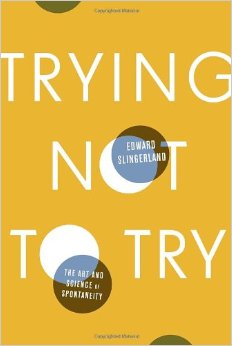“The paradox of Wu-Wei arises…”
The phone rings. I glance at my watch. 5:20 p.m.
We have a problem. We need your help.
Just one time, one time, it would be nice to get a different script at the end of the day. Dreamworks ~ The phone rings: “Hey DK, great news….”
My periscope is up and scanning the horizon. (Is the house burning or is it a pan on the stove that’s on fire? Fur is up.)
The interrogation commences.
Start from the beginning.
What options have you explored?
Did you check this? What about that?
Did you ask this? Did you ask that?
The team has done a thorough job in assessing the situation. (House is not burning. But it’s a large pan on the stove that’s smoldering.)
The anxiety is climbing. (Is that fear I’m smelling?)
The team, sensing a dead-end, is feeling out my receptivity for an exception approval. Meanwhile, I’m winding up the next series of questions and readying the cannon to fire:
How did we get here?
You’re bringing this to me now?
You committed to do what?
Count to three.
Pause.
Break the habit.
This pound of flesh will be costly.
Think about de.
(I didn’t know what “de” was but I understood from hundreds of pounds of flesh taken in similar situations that not having “de” was costly. Very costly. That’s right. It’s de. It’s not misspelled.)
I remove my puckered lips from the blow horn. And pause. The phone goes silent. There are five of us on the call. No background noise. No tapping on keys. The awkward silence hangs. A deep black hole.
The team waits on DK.
I’ve seen this movie before. I don’t recall how the Hero manages to save the day. But the Hero saves the day.
Today, I have nothing.
And then, Wu-Wei arrives…
(I slow it down. Slooooooooow it way down. There’s a way forward here. We just can’t see it now. I drop the blow horn and the stick.)
Team, you’ve done a great job here. It’s a tough situation. I’m with you. Let’s brainstorm for a few moments on our options and decide on the best path forward…
From Brainpickings by Edward Slingerland professor of Asian Studies and Embodied Cognition at the University of British Columbia in his book: – Trying Not to Try:
- “Our modern conception of human excellence is too often impoverished, cold, and bloodless. Success does not always come from thinking more rigorously or striving harder.”
- We find ourselves continually caught in this loop of trying so hard that we stymie our own efforts…where victory only comes when the player relaxes and stops trying to win
- We spend our lives “preoccupied with effort, the importance of working, striving, and trying,” only to find that the more we try to will things into manifesting, the more elusive they become. The result is that we too often devote ourselves to pushing harder or moving faster in areas of our life where effort and striving are, in fact, profoundly counterproductive.
- Wu-wei literally translates as “no trying” or “no doing,” but it’s not at all about dull inaction. In fact, it refers to the dynamic, effortless, and unselfconscious state of mind of a person who is optimally active and effective. People in wu-wei feel as if they are doing nothing, while at the same time they might be creating a brilliant work of art, smoothly negotiating a complex social situation, or even bringing the entire world into harmonious order. For a person in wu-wei, proper and effective conduct follows as automatically as the body gives in to the seductive rhythm of a song. This state of harmony is both complex and holistic, involving as it does the integration of the body, the emotions, and the mind. If we have to translate it, wu-wei is probably best rendered as something like “effortless action” or “spontaneous action.” Being in wu-wei is relaxing and enjoyable, but in a deeply rewarding way that distinguishes it from cruder or more mundane pleasures.
- People who are in wu-wei have de typically translated as “virtue,” “power,” or “charismatic power.” de is radiance that others can detect, and it serves as an outward signal that one is in wu-wei. de comes in handy in a variety of ways. For rulers and others involved in political life, de has a powerful, seemingly magical effect on those around them, allowing them to spread political order in an instantaneous fashion. They don’t have to issue threats or offer rewards, because people simply want to obey them… If you have de, people like you, trust you, and are relaxed around you.
- If you’re just using rewards and punishments — the rational, self-interested, cold-cognition strategy — it doesn’t matter what people feel on the inside. You set up the incentives, let people figure them out, and then judge them purely on their behavior. In the values model, on the other hand, what people are really feeling on the inside is crucial: if I can’t trust that you’re committed to the same ideals that I’m committed to, there’s no way we can work together.
- That’s where “the paradox of wu-wei” arises — the conundrum of trying not to try…Slingerland puts it elegantly: You can cultivate your sprouts: try to identify incipient tendencies of desirable behavior within you, and then nurture and expand them until they are strong enough to take over. Or you can just go with the flow: forget about trying, forget about not trying, and just let the values that you want to embrace pick you up and carry you along.
- We have been taught to believe that the best way to achieve our goals is to reason about them carefully and strive consciously to reach them. Unfortunately, in many areas of life this is terrible advice. Many desirable states — happiness, attractiveness, spontaneity — are best pursued indirectly, and conscious thought and effortful striving can actually interfere with their attainment.
Don’t miss full post by Maria Popova @ Brainpickings
Notes/Credits:
- Edward Slingerland’s book: Trying Not to Try
- Image source of Stuck: TruckingWorldwide


Where do you find this stuff?
LikeLike
Laughing. You mean the photograph of the CAT stuck in the mud? My stories? Brainpickings excellent post? Or my random parks around?
LikeLike
Ha! Oh, your stories. Or, the words from your stories. They’re singular in revealing some inner workings while leaving me both perplexed and curious for more.
LikeLike
Awwwww, you made my day. Thank you.
LikeLike
Excellent post and advice. My fear is that the wonderful message would be lost on the vast majority of todays leaders, and certainly the top CEO’s, all people who need it the most.
LikeLike
Thanks Larry. It is challenging. It is.
LikeLike
Brilliant. It’s counterintuitive to what we are wired to do. Act
LikeLike
It is. And so very counterintuitive to my wiring.
LikeLike
Oh, man, I needed this today. Writing has been impossible lately. Long bouts of the depressive cycle sometimes leave my brain fragmented, unable to connect the dots. But, Not Writing is unthinkable. Even after my therapist told me to take a break from it. So, today I will relax into the flow of whatever and let the next action present itself.
LikeLike
Sandy, check this out
http://www.stevenpressfield.com/2014/04/can-writing-be-taught/
LikeLike
Seen this movie several times, the script is set for all but the hero. It’s a tough call. But this too shall pass. Until the next time.
LikeLike
Smiling. So true Tiny. There’s always another time at bat…they keep coming. Thanks.
LikeLike
i love the concepts of de and wu-wei – truly. thank you for this post, dk. i always learn from you.
LikeLike
Thank you Beth…
LikeLike
My goodness, you practically described my typical Friday 5pm when someone walks into my office with a ‘do you have 5 minute’ message. Thanks for sharing, will work on the de.
LikeLike
Laughing. Yes, the Friday 5pm calls are especially wonderful. Thank you May. You are way ahead of many of us on understanding and executing on the “de” concept. I have seen it first hand.
LikeLike